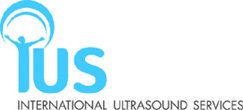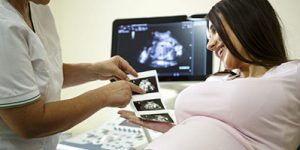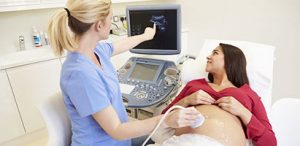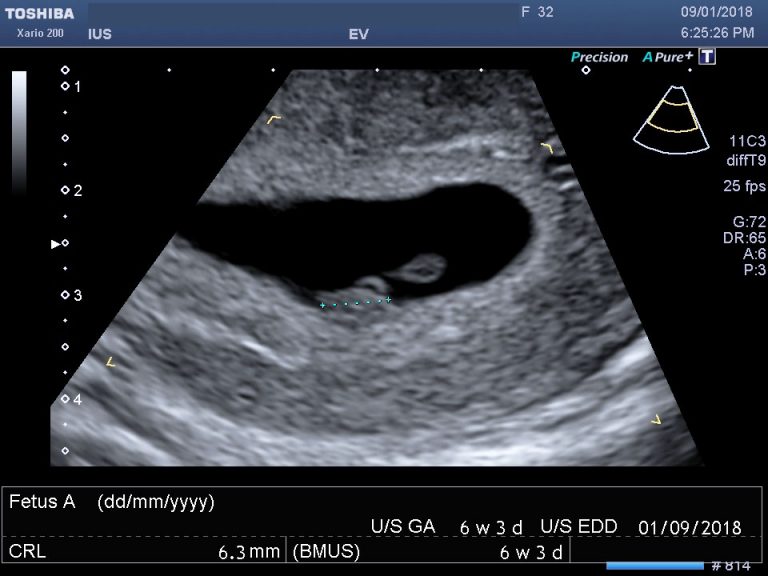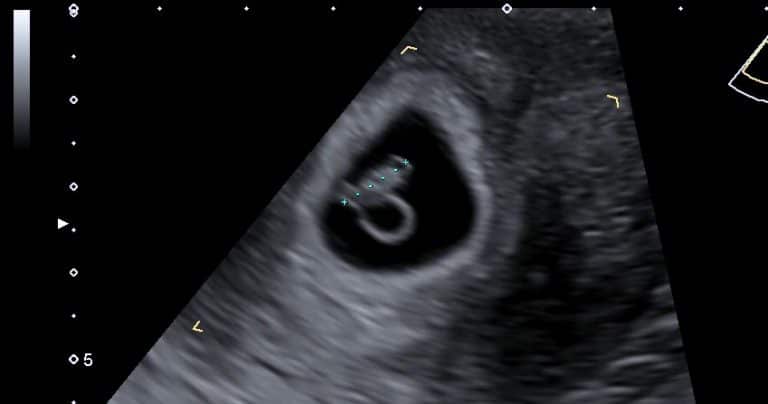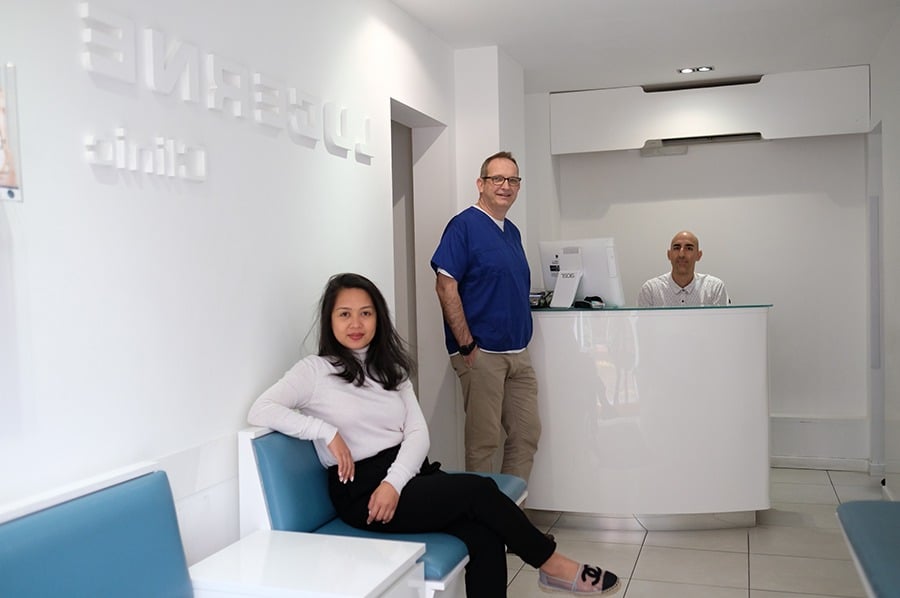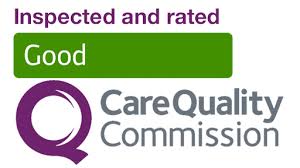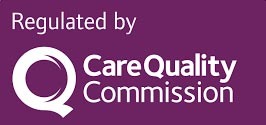Ultrasound is used during pregnancy to check the baby’s development and to help pick up any abnormalities.
Ultrasound technology has progressed so much that it is now possible to purchase a portable ultrasound scanner or even an ultrasound probe that wirelessly connects to your phone and allows to perform all sort of ultrasound scans such pregnancy scans, abdominal scans and scans for the heart.
These days there is a growing trend of expectant parents in purchasing an ultrasound scanner for home use and although it is understandable that new parents want to see their unborn baby there are concerns about safety and welfare not only of the foetus but also of the parents.
This article will offer you an overview of the potential biological effects of ultrasound and the current guidelines and recommendations, so you can make an informed decision about purchasing or not such a scanner for home use.
Can Ultrasound harm your baby?
A fundamental principle of medical ethics is “first do no harm” which is paraphrased in the Hippocratic Oath as ‘abstain from doing harm’. A second principle is that the potential benefits of a procedure should outweigh the risks, and it is only then that can be considered ethical.
Ultrasound scanning is generally safe when used appropriately and by trained professionals, as ultrasound energy has the potential of causing biological effects in the body.
Ultrasound waves can heat the tissues slightly and can also produce small pockets of gas in body fluids or tissues called cavitations. Ultrasound can cause harm if exposure is prolonged, in particular to sensitive organs, such as the baby’s eyes and brain.
The long-term consequences of these effects are still unknown. For these reasons, Medical and Ultrasound Societies do not recommend ultrasound examinations that have no medical value, such as in souvenir 4D baby scans.
What is the consensus of the Medical communities about baby scans at home?
There is a growing concern about baby scans at home from the medical communities and the Society and College of Radiographers, as well as the British Medical Ultrasound Society, have issued a position statement highlighting that
“ultrasound equipment should only be used by properly trained professionals.”
The statement says, “As ultrasound equipment develops and becomes more portable, it is much easier for members of the public to access either their own handheld ultrasound machine or probe that connects to a mobile phone/tablet, or to hire a machine.”
The document cites several sources including BMUS guidance, the World Federation for Ultrasound in Medicine and Biology, and two peer-reviewed papers from the British Medical Journal, all of which speak out strongly against the use of ultrasound by anyone other than trained professionals.
A letter has been sent from the presidents of the Society and BMUS to the Medicines & Healthcare Products Regulatory Agency, highlighting the concerns of ultrasound being used by untrained people and for non-medical reasons. The letter includes links to German legislation in which ultrasound examinations without a medical indication are prohibited.
Expectant Parents Anxiety
Most expectant parents are looking to purchase a scanner to use at home, mostly due to anxiety. This anxiety is derived from previous traumatic experiences such as previous miscarriages, and they believe that regularly checking the progress of the pregnancy will alleviate this anxiety.
Using an ultrasound machine at home, however, can have the opposite effect, causing more anxiety due to the inability to identify the baby or the heartbeat.
Ultrasound scanning might look easy when performed by a trained professional, but it’s not. The healthcare professional who performs the scans, more likely a Sonographer, has spent at least one year studying ultrasound in clinical usage and its bioeffects. Sonographers also have to perform a large number of scans supervised; pass the theory and practical exams before they are allowed to take responsibility for their own examinations.
Disadvantages of untrained parents using ultrasound at home
The use of ultrasound at home can provide false reassurance of fetal wellbeing or even cause harm if exposure is prolonged.
Use of handheld fetal heart rate Doppler systems by parents in their own home, where the fetal heart was incorrectly identified, have previously been reported as a cause of delayed presentation to medical care in fetal compromise and stillbirth.
Parental anxiety will increase when normal ultrasound images are misinterpreted during the scan undertaken by parents in their own homes.
This is why both the SCoR and BMUS recommend that “ultrasound examinations are only performed by appropriate professionals, who can interpret the ultrasound images accurately and use the equipment safely, to reduce any potential harm to the baby or anxiety for parents.”
4D ultrasound Scanning at home
Some of the latest portable scanners marketed for home use are able to perform 4D live scanning. As previously, this exposure of the foetus to ultrasound energy has no diagnostic value and can be dangerous. It is again, therefore, recommended that parents should weigh up the unknown risks against the benefits of having a keepsake ultrasound photo of their developing baby.
Purchasing an Ultrasound Scanner online.
Devices produced for home scans and purchased cheaply online, for example, eBay or Amazon may not have the same level of control and compliance with regulations as devices approved for healthcare settings and the level of quality assurance and testing might be limited in unregulated environments.
If you after all the previous recommendations you decide to purchase a baby scanner online instead of visit a reputable baby scan clinic, you should at least make sure that the equipment is CE marked.
Should you buy then a scanner for home use?
The answer is No unless you are a properly trained healthcare professional, as ultrasound imaging at home by untrained operators can cause more harm than good and can also have significant implications for the health and wellbeing of the unborn baby and parents to be.
Where to get a baby scan in London?
If you are looking for an early scan for reassurance in the early weeks in your pregnancy or a private baby scan to find your baby’s gender and get quick answers about your baby’s health, you can rest assured that our sonographers have the skills and the knowledge to provide you with the instant answers you need. The pregnancy ultrasound is a diagnostic scan that can help to reassure you that your pregnancy is normally progressing and detect any abnormalities. You can now book your appointment online or over the phone.
The private baby scans are performed by highly qualified sonographers who perform precise baby scans to help predict and diagnose any situation that might arise. Our patients benefit from early diagnosis and treatment of prenatal complications, as well as routine obstetric scanning.
Private Pregnancy Scans
We offer the following complementary to the NHS private baby scans in our ultrasound clinic in London.
References:
BMUS – Statement for the General Public
on the Safety of Medical Ultrasound Imaging
World Federation for Ultrasound in Medicine and Biology and the International Society of Ultrasound in Obstetrics and Gynecology. WBUMB. WFUMB/ISUOG policy statement on souvenir imaging of the fetus. 2019
Aust, T. Ankers, D. & Famoriyo, A. 2009, “Caution with home fetal Doppler devices”, BMJ. 339 (7718). pp. 448-448. DOI: https://doi.org/10.1136/bmj.b3220
Chakladar, A. & Adams, H. 2009. “Dangers of listening to the fetal heart at home”, BMJ. 339 (7730). pp. 1112-1113. DOI: https://doi.org/10.1136/bmj.b4308
Howard, S. The rise of the souvenir scanners: ultrasonography on the high street. BMJ 2020; 307: m1321. https://doi.org/10.1136/bmj.m1321
Professional Standards Authority. 2019. Right-touch assurance for sonographers based on risk of harm arising from practice. https://www.professionalstandards.org.uk/docs/default-source/publication..
Centre for Workforce Intelligence. 2017. Securing the future workforce supply Sonography workforce review. https://assets.publishing.service.gov.uk/government/uploads/system/uploa…
The Consortium for the Accreditation of Sonographic Education (CASE). Ultrasound Programme Annual Monitoring data 2018-19. Unpublished.
The Society and College of Radiographers. 2020. SCoR and BMUS position statement: The use of portable ultrasound equipment for at home pregnancy scanning. https://www.sor.org/sites/default/files/document-versions/scor_and_bmus_…
Health and Care Professions Council. Check the register. https://www.hcpc-uk.org/check-the-register/
Nursing and Midwifery Council. Search the register. https://www.nmc.org.uk/registration/search-the-register/
General Medical Council. Find a doctor’s record on the medical register. https://www.gmc-uk.org/registration-and-licensing/the-medical-register/a…
Society and College of Radiographers. Register of Sonographers. https://www.sor.org/practice/ultrasound/register-sonographers
NHS. 20 week scan. www.nhs.uk/conditions/pregnancy-and-baby/20-week-scan.
Royal College of Obstetricians and Gynaecologists. Ultrasound from conception to 10+0 weeks of gestation (scientific impact paper no. 49). 13 March 2015. www.rcog.org.uk/en/guidelines-research-services/guidelines/sip49.
British Medical Ultrasound Society. ECMUS statement on souvenir scanning. 2007. www.bmus.org/static/uploads/resources/ECMUS_Souvenir_Scanning.pdf.
British Medical Ultrasound Society. Guidelines for the safe use of diagnostic ultrasound equipment. 2010. www.bmus.org/static/uploads/resources/BMUS-Safety-Guidelines-2009-revision-FINAL-Nov-2009.pdf.
Society of Radiographers. Souvenir scanning. 2009. www.sor.org/ezines/toptalk/issue-55/souvenir-scanning.
Medically Reviewed by Tareq Ismail Pg(Dip), BSc (Hons)
